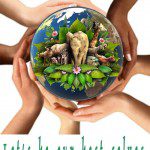It’s long past time for Christians to respond to the climate crisis. “For God so loved THE WORLD” (John 3:16) means that God loves THE WORLD. The Earth Martyrs show us what is means to love Earth enough to die protecting it.
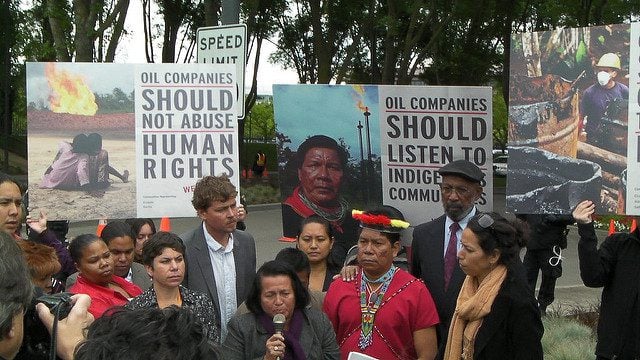
In an article I wrote for the Christian Century, I explained that as much as I encourage churches to celebrate God’s Creation on Earth Day, we need to move beyond feel-good “green” hymns and ecological tokenism. I say this because in my heart of hearts, I’m very worried.
Why I’m worried
I’m worried because the Trump administration has given us the most anti-environmental cabinet in our nation’s history. And because Congress voted to roll back environmental regulations that protect the health of so many, especially children who are much more sensitive to toxins and pollution.
I’m worried because the number of children diagnosed with cancer has risen 40% over the past 16 years because of air pollution, pesticides, and radiation.
When I turn on the Weather Channel app on my phone and see the massive waterfall cascading down an ice shelf from warming temperatures. In April. That makes me worry.
And I’m worried when I read about people who are being murdered because they want to protect the land, water, and air in their communities.
Waldomiro Costa Pereira, a Brazilian land rights activist, was murdered for trying to protect his people’s land from ravenous corporations and wealthy landowners.
Luiz Alberto Araújo, a government official in Brazil’s environmental office was murdered in October 2016.
He had exposed a deforestation operation that used slave laborers; reported the operators of a hydroelectric dam responsible for the death of 16.2 tons of fish. Not to mention his efforts to help shut down a gold mine that was leaking “mercury and other pollutants into the river Curuá, poisoning the food chain of the Kayapó indigenous tribe,” (Matt Sandy, “Murder of Brazil official marks new low in war on Amazon environmentalists,” The Guardian, October 24, 2016). Araújo was doing a hero’s work. And those efforts of exposing corruption and fighting rapacious environmental negligence resulted in his murder.
As I read these stories, it hits me – these people are dying to protect the sanctity of God’s Earth and indigenous communities.
People in Brazil, Standing Rock, rural communities fighting the shale gas industry, communities of color victimized by eco-racism, and island nations drowning from rising seas – they are suffering and dying for the Earth.
And so I have to ask:
Is Earth worth dying for?
In my book Creation-Crisis Preaching: Ecology, Theology, and the Pulpit, I introduced the term “eco-crucifixion,” which describes environmental devastation in terms of the death suffered by Jesus of Nazareth. Jesus was a prophet, a teacher, a person who stood up for the poor in the face of the wealthy who took advantage of them.
We often hear the phrase, “Jesus died for my/our sins.” But John 3:16 tells us: “For God so loved the world that he gave his only begotten son…”
Did you catch that?
The world in Greek is cosmos. God’s love is not just limited to humans. God loves the whole world. Jesus loved the whole world. He entered into the messy stuff of this world because of the suffering, death, and evil that is in need of healing. Jesus entered nature itself to heal it from within. He was willing to die for the love of this world.
So the Divine answer is, yes – Earth is worth dying for.
Apparently Waldomiro Pereira and Luiz Araújo and all the other Earth-martyrs were willing to die for that same love.
Earth Martyrs
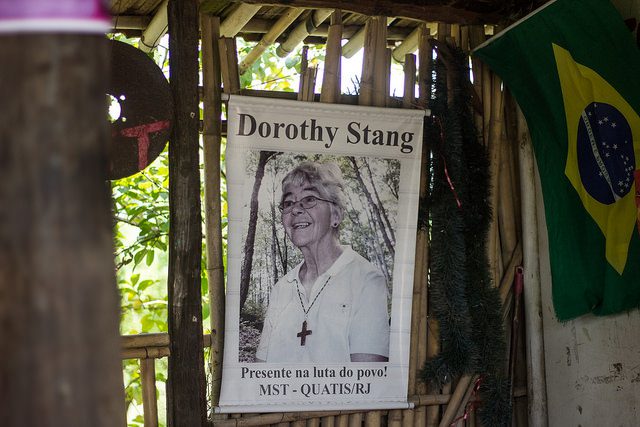
I call them martyrs. Because, like the early Christians who faced death for refusing to renounce their faith, people like Sister Dorothy Mae Stang exemplify the sacrificial love of God who steadfastly proclaims that those most vulnerable – including Earth itself – are worth dying for. Sister Dorothy was a nun murdered in 2005 for her work to protect impoverished Brazilian communities in the Amazon from corrupt governments, companies and criminal gangs. They are seizing land from individuals and communities in order to meet the demand for products like minerals, timber, and fossil fuels.
I may think that kind of criminal activity is barbaric. But then I realize I’m part of the reason for the demand of those products. I use these fossil fuels. My phone has those minerals in its processing unit. My house may have some of that timber. So I have to ask myself:
Is my phone and my gasoline and my wooden railing worth the lives of people like Sister Dorothy?
Of course not. No decent person would willingly participate in an activity that results in the death of another. No one wants to live in a place that is polluted, or where the water is undrinkable, or the air unbreathable, or where the sea levels are rising higher every year. So this is the conundrum, isn’t it? We are good people. And yet our lives, our food, our fuel, our homes, our phones, are all caught up in a system that does bad things to people and God’s Creation.
So what can we do?
As Christians, we can look to passages in both the Hebrew and Christian scriptures give us some guidance for how we can respond to this conundrum and crisis of justice. The Gospel Matthew describes Jesus using the ancient words of the prophet Isaiah:
18“Here is my servant, whom I have chosen, my beloved, with whom my soul is well pleased. I will put my Spirit upon him, and he will proclaim justice to the Gentiles. 19He will not wrangle or cry aloud, nor will anyone hear his voice in the streets. 20He will not break a bruised reed or quench a smoldering wick until he brings justice to victory,” (Matthew 12:18-20, NRSV).
In other words, we follow a Lord who proclaims justice – who told the truth about the plight of those who were suffering.
We follow a Lord who does not break a bruised reed. This means that the ones who are already wounded, even the wounded parts of our Earth – Jesus sees, and empowers us to protect. We follow a Lord who is bringing “justice to victory.” Which means that Jesus recognizes that doing the right thing must be prioritized over doing the successful thing.
As Jesus’s followers, then, we are called to do these same things. We tell the truth about the Earth martyrs and the imperiled communities they are defending. We avoid breaking the bruised reed. And we hold ourselves back from doing further harm to that which has already been done. When we realize that we are doing harm, we find out ways to make it right, and to try to bring about healing. We bring justice to victory. In other words, we refuse to be satisfied with “the good life” unless it can be shared equitably by all in a way that the Earth can sustain.
All hands on deck!
Isaiah 42:6-7 says, “The coastlands wait for his teaching. I have called you in righteousness, I have taken you by the hand and kept you; I have given you as a covenant to the people, a light to the nations,7to open the eyes that are blind, to bring out the prisoners from the dungeon, from the prison those who sit in darkness.”
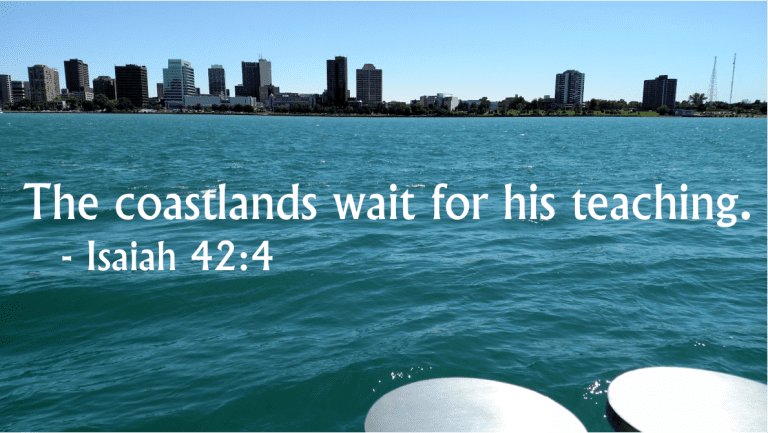
You see, this is an all-hands-on-deck moment in the history of the church, in the history of the human species. No matter who you are, or what you do, or what your sphere of influence is – you have been given as a promise to all people, a light to the nations, to open the eyes of the blind.
The coastlands, the forests, the icebergs, the deserts, your own city or town all wait for you to live out Jesus’ teachings.
If you’re an investment manager – help your clients learn about divesting from fossil fuels and investing in ecologically-responsible stocks.
If you’re a medical practitioner – help people connect the dots between their own health and the health of the ecosystems around them.
Maybe you’re a parent. Encourage your kids to learn about science. And to apply the ethical Christian values they learn here in church to their lives and work in the world.
If you’re a teacher – find ways to help people see how environmental issues have an impact on whatever subject you teach, whether it’s math, or phys ed, or, in my case, preaching and theology.
If you’re a kid – go play outside! Take a magnifying glass out to the grass and find out what lives there. Learn about your neighbors in God’s Creation, just like you learn about your friends here at church. [For more ideas for helping kids connect their faith with God’s Creation, click here.]
Maybe you’re a writer. Send a letter to the editor of your newspaper.
If you’re retired or feel like any of these kinds of task are not for you – just take some seeds, put them in a little pot of soil and let them grow. Watch them bring pleasure to other people who can see the beauty of what God has created.
The faithfulness of the Earth Martyrs shows us that because Earth is worth dying for, we now know what is worth living for.
Earth is worth living for!
Indigenous communities are worth protecting. The air that my children breathe and the water they drink is worth cleaning up. And Jesus’ virtues of integrity and radical compassion are values worth devoting my life to. Without them, the human species will dwindle to extinction.
As we advocate for this planet and all that lives therein, I’m standing in solidarity with the Earth-martyrs. I pray that I may have such dedication and courage. I’m trusting in the mercy of a Creator who declared this planet good – not good just because you can buy it and sell it. But good because it simply exists.
Which means that I’m also proclaiming an “eco-resurrection.”
Because when I see millions of people marching for science and the preservation of our planet – I see God at work.
When I see places like El Salvador ban gold mining in favor of something much more precious – protecting its fragile water systems – I see God at work.
When I see Mexico move to protect 160 million acres for environmental conservation – I see God at work.
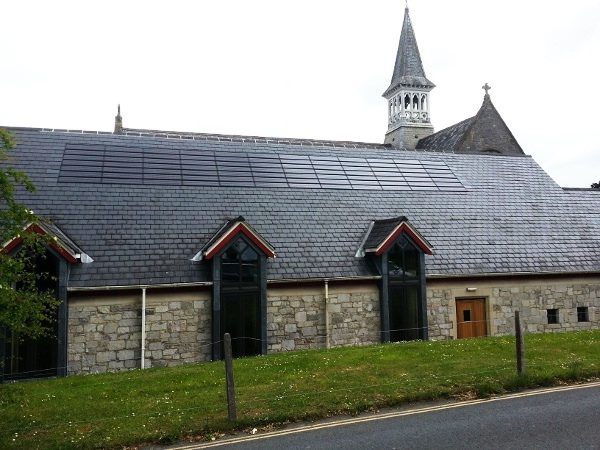
When I see solar panels going up on church roofs and congregations starting eco-ministries – I see God at work.
And this gives me hope!
Maybe even your congregation could start an eco-ministry? It’s starts with just asking the question. You may be surprised at who might respond to the call.
The God of Creation says: 8I am the Lord, that is my name. 9See, the former things have come to pass, and new things I now declare; before they spring forth, I tell you of them. (Isaiah 42:8-9).
God is declaring a new thing to us. Despite all that we have done, I choose to respond from a place of hope, from a place of resurrection. And I can’t wait to see this new life spring forth!
- For ideas on incorporating Earth-care into faith practices and preaching, try 17 Ways to be an EcoPreacher.
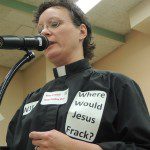
Leah D. Schade is the Assistant Professor of Preaching and Worship at Lexington Theological Seminary (Kentucky) and author of the book Creation-CrisisPreaching: Ecology, Theology, and the Pulpit (Chalice Press, 2015).
You can follow Leah on Twitter at @LeahSchade, and on Facebook at https://www.facebook.com/LeahDSchade/.
Leah will be presenting at the Wild Goose Festival in Hot Spring, NC, July 14 and 15! Her session info is available here: http://wildgoosefestival.org/sessions17-24/. Enter the special code BEMYGUEST for a 25% discount on tickets!
Sources:
Sandy, Matt. “Murder of Brazil Official Marks New Low in War on Amazon Environmentalists.” The Guardian. Guardian News and Media, 24 Oct. 2016. Web. 21 Mar. 2017. https://www.theguardian.com/world/2016/oct/24/brazil-amazon-environmentalist-murder-luiz-alberto-araujo
Reuters In Rio De Janeiro. “Land Rights Activist Shot Dead in Brazilian Amazon Hospital.” The Guardian. Guardian News and Media, 21 Mar. 2017. Web. 21 Mar. 2017. https://www.theguardian.com/world/2017/mar/21/brazil-land-rights-activist-shot-dead-amazon-hospital
Holmes, Oliver. “Environmental Activist Murders Set Record as 2015 Became Deadliest Year.” The Guardian. Guardian News and Media, 20 June 2016. Web. 21 Mar. 2017. https://www.theguardian.com/environment/2016/jun/20/environmental-activist-murders-global-witness-report


